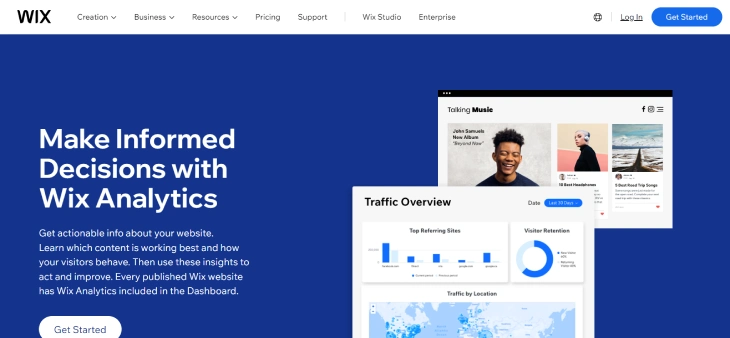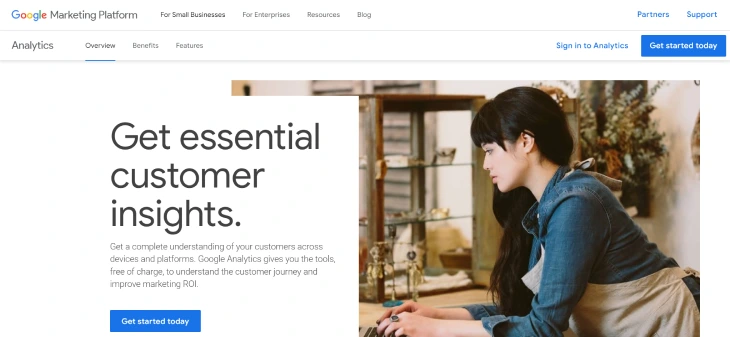
Analytics tools are essential for businesses looking to gain valuable insights into their website performance and user behavior. These tools provide data and metrics that can help businesses make informed decisions, optimize their marketing strategies, and improve their website. Two popular analytics tools that businesses often consider are Wix Analytics and Google Analytics. Wix Analytics is a user-friendly, built-in analytics tool provided by the Wix platform that offers metrics and reports such as page views, bounce rate, traffic sources, and conversion rates. Google Analytics is a more advanced analytics tool offered by Google that provides in-depth insights into user behavior, customizable metrics, and reporting capabilities.
This post compares Wix Analytics and Google Analytics to assist businesses in determining which tool aligns with their specific needs and goals. It offers a comparative overview of both tools, highlighting their key features and capabilities, and provides an overview of their pros and cons. With this knowledge, businesses can make an informed decision about which tool aligns with their specific needs and goals, and choose the one that is right for them.
Wix Analytics Vs. Google Analytics: Comparative Overview
When it comes to choosing an analytics tool, businesses often compare Wix Analytics and Google Analytics to determine which one is the best fit for their needs.
Here's a comparative overview of both analytics tools to help you choose which one is best suited for their specific needs and goals:
|
Ease of Use |
Metrics and Reports |
Integration |
Data Accuracy |
|
|
Wix Analytics |
|
|
|
|
|
Google Analytics |
|
|
|
|
Wix Analytics Vs. Google Analytics: Pros and Cons Overview
The decision between using Wix Analytics and Google Analytics depends on the specific needs and goals of a business. Both tools have their strengths and weaknesses, and it's important to carefully evaluate the pros and cons of each before making a decision.
Here's an overview of both analytics tool's pros and cons:
|
Pros |
Cons |
|
|
Wix Analytics |
|
|
|
Google Analytics |
|
|
Importance of Analytics Tool
Analytics tools play a critical role in helping businesses gain valuable insights into their website performance and user behavior. These tools enable businesses to make data-driven decisions, optimize their marketing efforts, and improve user experience. Both Wix Analytics and Google Analytics offer unique features and capabilities that can benefit businesses in different ways.
Here are some of the key reasons why an analytics tool is important for businesses:
Data-Driven Decision Making
One of the primary benefits of using an analytics tool is the ability to make data-driven decisions. With access to real-time data and metrics, businesses can gain a better understanding of their website performance and user behavior, and use this information to make informed decisions.
Both Wix Analytics and Google Analytics provide businesses with a range of metrics and reports, including page views, bounce rate, traffic sources, and conversion rates, enabling them to make data-driven decisions that improve their website.
User Behavior Analysis
Another important benefit of using an analytics tool is the ability to analyze user behavior. By tracking user actions and behavior on their website, businesses can gain valuable insights into what works and what doesn't, and use this information to optimize their website and improve user experience.
Wix Analytics and Google Analytics both offer user behavior analysis capabilities, such as user flow and goal tracking, enabling businesses to understand how users interact with their websites and make improvements accordingly.
Marketing Optimization
An analytics tool can also help businesses optimize their marketing efforts. By tracking the effectiveness of their marketing campaigns and analyzing user behavior, businesses can gain a better understanding of what works and what doesn't, and use this information to optimize their marketing strategies.
Both Wix Analytics and Google Analytics offer marketing optimization capabilities, such as conversion tracking and audience segmentation, enabling businesses to improve their marketing ROI and drive growth.

Choosing the Best Analytics Tool
Choosing the best analytics tool for your business is important to gaining valuable insights into website performance and user behavior. When evaluating different analytics tools, it's important to consider factors that meet your unique needs and help you make data-driven decisions.
Here are some key considerations for each of these factors:
Ease of Use
The ease of use of an analytics tool is an important consideration, especially for businesses without extensive technical expertise. A user-friendly interface and simple setup process can make it easier for businesses to get started and gain valuable insights without requiring extensive training or support.
An intuitive and well-designed analytics tool can also help businesses save time and resources by streamlining data analysis and reporting.
Metrics and Reports
The metrics and reports provided by an analytics tool can help businesses track website performance and user behavior. It's important to consider the range and depth of metrics and reports offered, as well as the ability to customize reports to meet specific business needs.
For example, a business may want to track specific user actions, such as form submissions or product purchases, and create custom reports to analyze this data. The ability to segment data by factors such as location, device, and user demographics can also provide valuable insights into user behavior and preferences.
Integration
Integration with other tools and platforms can greatly enhance the functionality of an analytics tool. It's important to consider the level of integration offered with third-party tools and platforms, as well as the ability to seamlessly integrate with existing systems and workflows.
For example, integration with marketing automation tools can help businesses track the effectiveness of their campaigns and optimize their strategies. Additionally, integration with customer relationship management (CRM) systems can provide valuable insights into customer behavior and preferences.
Data Accuracy
The accuracy of data provided by an analytics tool is crucial for making informed decisions. It's important to consider the data collection methods used, as well as the ability to filter out spam and bot traffic to ensure accurate and reliable insights.
For example, an analytics tool that uses data sampling for larger data sets may not provide as accurate insights as one that analyzes the entire data set. The ability to set up custom filters and segments can also help businesses ensure that they are analyzing the most relevant and accurate data for their specific needs.

Conclusion: Which Is Better, Wix Analytics or Google Analytics?
Choosing the right analytics tool is important for businesses looking to gain valuable insights into their website performance and user behavior. Both Wix Analytics and Google Analytics offer unique features and capabilities, and the decision ultimately depends on the specific needs and goals of the business.
By carefully evaluating the pros and cons of each tool, businesses can make an informed decision and choose the one that best meets their needs. With the right analytics tool in place, businesses can optimize their online presence, improve user experience, and drive growth.
* read the rest of the post and open up an offer